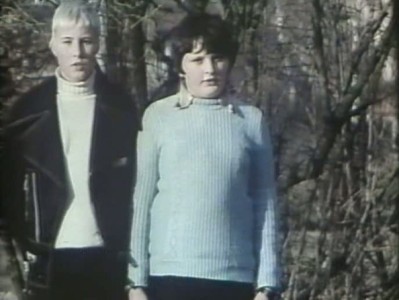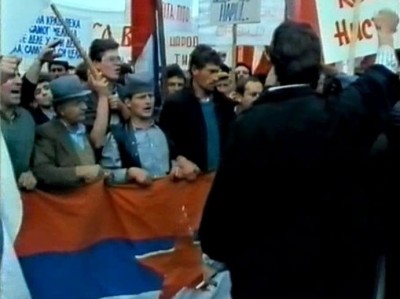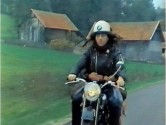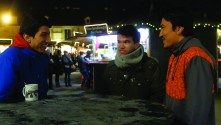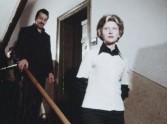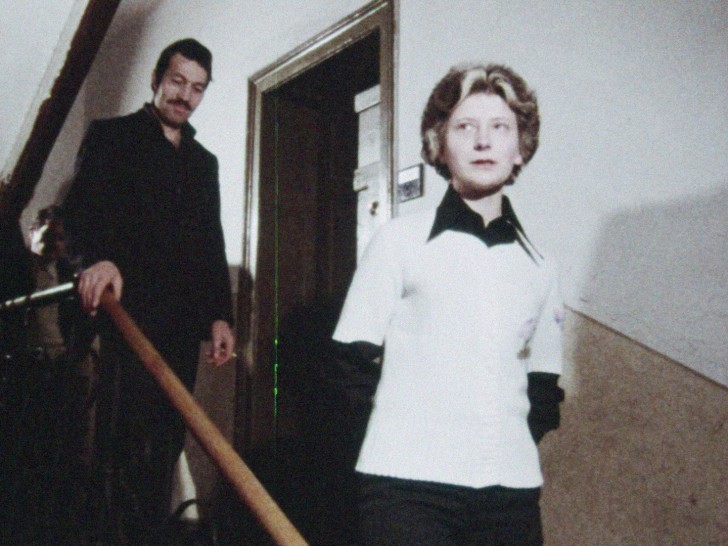
Filmmaker, Guest Worker: Zelimir Zilnik’s Expatriates
West German Short Films Program
$15 Special Event Tickets
“I do not want to merely make films about guest workers; rather, as a guest worker myself, I would also like to learn something.” After six years of filmmaking in Yugoslavia—where his cinema, along with that of fellow Black Wavers, faced state repression—Zilnik emigrated to West Germany. In 1974, with the help of Vlada Majic as cinematographer and producer, the documentarist completed two films. Request is a single-take observation of an exchange between a Greek construction worker and a German lorry driver; in an exhibition of interethnic solidarity, the latter helps the former draft an official letter to the BRD authorities. Öffentliche Hinrichtung (Public Execution), meanwhile, dissects overviolent tactics used by the Bundespolizei, implicating mass media as accomplices and profiteers. While Request was thought to have been lost until 2020, Public Execution never received screening permission from the FSK, Germany’s cinema rating organization. The film—initially shot in color yet surviving only in a black-and-white working copy—remains unapproved for public exhibition in that country.
1975 was an inspired year, with Zilnik concocting five incendiary shorts in rapid succession. Abschied (Farewell), Hausordnung (House Orders) and Unter Denkmalschutz (Under the Protection of the State) were all likewise assumed lost until discovered in an archive very recently. Experiences and travails of former Yugoslav Gastarbeiter are highlighted in films as succinct as they are incisive. In Farewell, a Serb worker who spent five years at a Bavarian BMW factory bids goodbye to the country of his employment, using the final minutes before his train departure to show Zilnik’s camera the items he is bringing home: a vacuum cleaner (150 marks), an electric jig saw (50 marks), and some fabric for the kids. In House Orders, the director’s scope zooms out to offer a panoramic view of the intolerable living conditions of foreign workers, strapped and disciplined by house rules—both in their dilapidated apartment buildings and in German monoculture itself. To drive the point home, Under the Protection of the State takes the viewer on a guided tour of an aging residential complex whose owner (a high-ranking state MP) had the architecture classified as an historic-cultural landmark in order to avoid undertaking necessary repair and upkeep. If the dwelling is “under the protection of the state,” then its residents are under that state’s unlimited neglect, time and again subjected to violence, eviction threats and infringements of privacy. Here, Zilnik occupies the subject position of a witness, listening attentively to the testimonies of his subjects. At times, the director interjects, drawing attention to his presence; yet these appearances are infrequent, as the action generally unfolds with minimal editing, no extradiegetic sound, and in an unbroken time and space.
Unlike most of Zilnik’s 70s shorts, Inventur – Metzstraße 11 (Inventory) has circulated widely. In this nine-minute tour de force, an immobile camera at the bottom of a staircase at the eponymous Munich address takes stock of around three dozen tenants that call the apartment building home. (Incidentally, Metzstraße 11 lies only a block away from where Rainer Werner Fassbinder shot Angst essen Seele auf (Ali: Fear Eats the Soul) a year earlier.) Each inhabitant descends the stairway at their own pace and introduces themselves in a language of their choosing: German is heard often, yet so is Italian, Greek, Turkish and Serbo-Croatian. Zilnik’s gaze is static and deceptively bureaucratic, with subjects captured one after another as if on an administrative conveyor belt. Yet the approach betrays warmth and intimacy, as the denizens’ individual approaches—some opting to state only raw facts (name, age, country of origin), others spilling out their deep existential concerns—testify to the trust, openness and collective freedom that Zilnik’s act of filming instantiates. The seven-film program of West German shorts is closed out by I Do Not Know What That Should Mean, in which Zilnik collages idyllic landscapes with scenes of elderly men and schoolkids reciting Heine’s “Die Lorelei.” Issues of national belonging, cultural atavism, and Germany after Hitler come to the fore in a film as silently understated as it is subversively ironic.
PROGRAM
-
Request (Antrag)
Directed by Zelimir Zilnik.
West Germany, 1974, digital video, color, 10 min.
German with English subtitles.Public Execution (Öffentliche Hinrichtung)
Directed by Zelimir Zilnik.
Yugoslavia, 1974, digital video, black & white, 9 min.
Serbo-Croatian with English subtitles.
Copy source: Filmmaker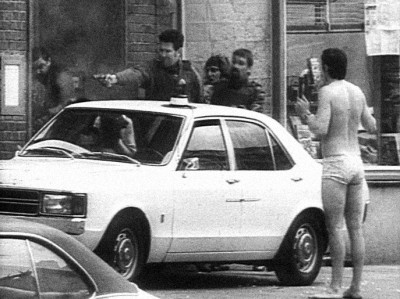
Under the Protection of the State (Unter Denkmalschultz)
Directed by Zelimir Zilnik.
Yugoslavia, 1975, digital video, black & white, 11 min.
Serbo-Croatian with English subtitles.
Copy source: FilmmakerInventory (Inventur Metzstrasse 11)
Directed by Zelimir Zilnik.
West Germany, 1975, digital video, color, 9 min.
German with English subtitles.
Copy source: Filmmaker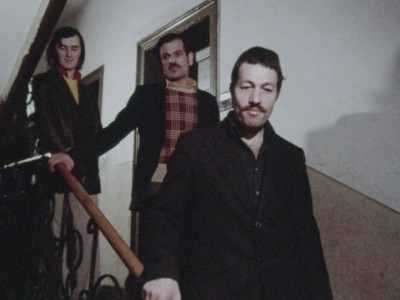
House Orders (Hausordnung)
Directed by Zelimir Zilnik.
West Germany, 1975, digital video, black & white, 12 min.
German with English subtitles.
Copy source: FilmmakerFarewell (Abschied)
Directed by Zelimir Zilnik.
Yugoslavia, 1975, digital video, color, 9 min.
Serbo-Croatian with English subtitles.
Copy source: FilmmakerPart of film series



